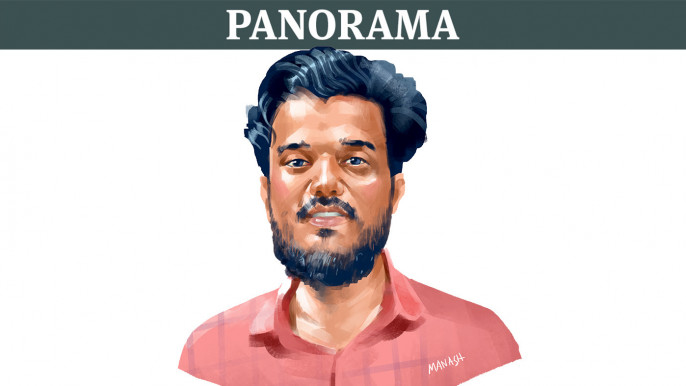Abdul Kader, a student of the Social Welfare and Research Institute at the University of Dhaka (2018-19 session), significantly altered the course of the quota reform movement with his nine-point demands, which eventually led to the downfall of Sheikh Hasina. The DGFI even instructed the media not to broadcast any content related to Kader.
Kader’s efforts in the movement weren’t the result of a single masterstroke or the work of just one leader. It was a coordinated effort, like a relay race, where when one group of coordinators was caught, another emerged to lead.
In this relay, every participant played an equally important role. Kader played his part by presenting the nine-point demands, which became the focal point of the movement after the quota was reduced from 56% to 7%. When six main coordinators were detained by the detective branch (DB) police, Kader continued to lead the movement.
Explaining the rationale behind the demands, Kader said, “Reducing the quota alone cannot be the only outcome, considering the lives lost in this struggle.”
Driven by the dream of lifting his family out of poverty, Kader enrolled at the University of Dhaka in 2018-19, ranking 366th in the B-unit entrance exam. Although he wanted to study law, he couldn’t secure a place and later joined the Social Welfare and Research Institute. He humorously referred to his institute as “Azimpur University” because the building was in Azimpur, far from the main campus.
While studying at Dhaka College, Kader frequently visited the Dhaka University campus. He said, “Whenever I felt down, I would spend some time in front of Bijoy Ekattor Hall – it looked beautiful from the outside. It inspired me to get admitted to Dhaka University.”
Before Kader’s birth, his father, Abdur Rahman, had prayed for seven years for a child and promised to make him a Hafiz if his wish was fulfilled. Born and raised in Mandari Union, Lakshmipur, Kader initially pursued a path to becoming a Hafiz. However, after more than a year of trying, he switched to a regular madrasa and later joined the national curriculum, eventually enrolling in Dhaka College.
With his family in financial difficulty, his two younger brothers were also studying in madrasas. His father, a security guard by profession, sent him 3,000 taka a month for his expenses in Dhaka. Kader said, “I managed to get by with that money in the hostel.” His mother, Fatema Begum, always supported him, and relatives also provided financial assistance.
Kader’s uncle was the only educated person in their family, having studied in the Arabic department at Dhaka University. However, Kader’s mother wanted him to become a lawyer. Kader said, “My mother had a special interest in the legal profession, and I dreamt of becoming a lawyer, wearing that black gown. She also instilled in me the habit of standing against any injustice.” However, due to slight weakness in English, he wasn’t considered qualified to study law or his second choice, international relations.
Kader lived in a hostel and with relatives in Azimpur. He eventually secured a place in Bijoy Ekattor Hall, where he shared a dormitory with nearly 100 others under the leadership of Abu Yunus, a notorious Chhatra League leader known for his aggressive stance against discrimination.
Then came October 7, 2019, when BUET student Abrar Fahad was beaten to death by Chhatra League members. Afterward, Kader posted on Facebook against the guest room and dormitory culture, leading to clashes with Chhatra League leaders and ultimately his eviction from the hall.
Kader regularly expressed his opinions on various issues and participated in every protest or movement, whether directly involved or not. His interest in politics led him to consider joining a political party, and he attended several political events in search of the right party. However, none fully attracted him, leaving him indecisive.
In 2020, Kader faced a major setback when his father lost his job. As responsibilities increased, Kader began working to support himself and his family. He started in the cutting department of a garment factory in Savar and later moved to a mask factory, barely earning enough to survive. Kader said, “I had to earn money by any means.” During the COVID-19 lockdown, when there were no academic activities, this became the focus of his life.
Due to his outspoken posts on social media, Kader gradually became isolated. Some friends distanced themselves out of fear of Chhatra League’s retaliation, while others began to ideologically disagree with him. Kader recalled, “I felt very alone. That time hurt me deeply.”
By 2022, Kader became politically active in the Bangladesh Chhatra Adhikar Parishad, working with leaders like Asif Mahmud and Akhtar Hossain. That year, they organized an event to commemorate Abrar Fahad’s death anniversary, which led to clashes with the Chhatra League. Kader and 23 others were arrested, marking his first time in jail. He spent 31 days in Keraniganj Prison, an experience he said changed his life. During this time, his family’s financial crisis persisted.
His mother often warned him, “If you die, we will have no hope left.” But Kader knew how to respond: “Do you want me to stop protesting against injustice then?” This left his mother speechless because she knew Kader was using the very lessons she had taught him against her. The only thing she had taught her son in their struggle was to stand for justice.
Kader stood by his beliefs. When the High Court reinstated the quota system for government jobs in 2018, he protested on June 5 of this year, unaware that it would lead to a massive revolution.
Kader’s Involvement in the Movement
Abdul Kader is no longer associated with the Bangladesh Chhatra Adhikar Parishad. Following his political mentor Asif Mahmud (now an interim government advisor), he joined the Democratic Chhatra Shakti, a new political organization.
On June 5, Nahid Islam first messaged in their internal WhatsApp group, “We must protest against the reinstatement of the quota now.” Although Kader was in a tuition session, he quickly returned to campus. That night, Rifat Rashid opened a Facebook group called “Quota Reinstatement Must Not Happen.” Hasib Al Islam, Abu Bakar Mazumder, Asif Mahmud, and Abdul Hannan Masud went to the central library and urged people to join their protest. Kader joined the protest, and everything started from there.
Kader was always involved in the movement. He said, “On July 16, we gathered at Shaheed Minar, and then we received news that Abu Sayeed from Begum Rokeya University had died.”
That day, six people died, and the movement took a new turn.
A Zoom meeting was held at midnight. Kader recalled the first agenda was clear: “We lost six students; is just quota reform enough? Everyone agreed it wasn’t. The Home Minister had to resign, and the Prime Minister had to apologize publicly.” Beyond this, various demands emerged, which later transformed into the nine-point demands.
The protest quickly intensified, and more lives were lost. On July 19, Nahid was arrested, Asif and Bakar had been arrested two days earlier. Hasnat and Sarzis met with three ministers and presented eight demands to the media.
However, Kader noticed that some key demands discussed earlier were missing from the eight-point demands. He took action and began re-publishing the demands through the media from July 20 onwards.
He said, “When we saw that the eight-point demands were not ours, we rejected them and released the nine-point demands, which were supported by over 50 coordinators. But the DGFI instructed the media to only broadcast the eight-point demands, not the nine. We believe DGFI altered the demands.”
Without internet access, Kader had to send the demands point by point to journalists. In some cases, they were delivered via pen drive. Kader explained, “I used a simple phone. Every night at 9 PM, I would talk to the media. I would walk two kilometers from where I was staying, turn on the phone, talk to the media, turn off the phone, and return to my place.”
Kader spent nights in different places, even in mosques, but he continued to promote the nine-point demands. On July 24, his mentor Asif Mahmud was found on the streets four days after being abducted. Asif called Kader and said, “You’ve disrupted their game plan. Your nine-point demands are changing the movement. They’re now after you. Be careful.”
Most ordinary people rejected the eight-point demands and supported the nine-point demands, which were published in some print media like The Business Standard.
Injured Nahid returned from the custody of law enforcement and was admitted to a hospital. He focused on four demands for immediate stabilization, including the restoration of internet connectivity.
When six main coordinators were detained on July 26 and 27, a leadership void was created. The movement then centered around Abdul Kader’s nine-point demands, and he led the strike.
The internet was restored, and Kader realized the gravity of the situation. He said, “We felt that so many people had lost their lives due to our call. Where lives are at stake, mere quota reform is insufficient – the government had to pay half the price. So the nine-point demands were designed to shock the government.”
Since the senior leaders were in DB custody, Kader and other students took on the responsibility. Kader said, “










